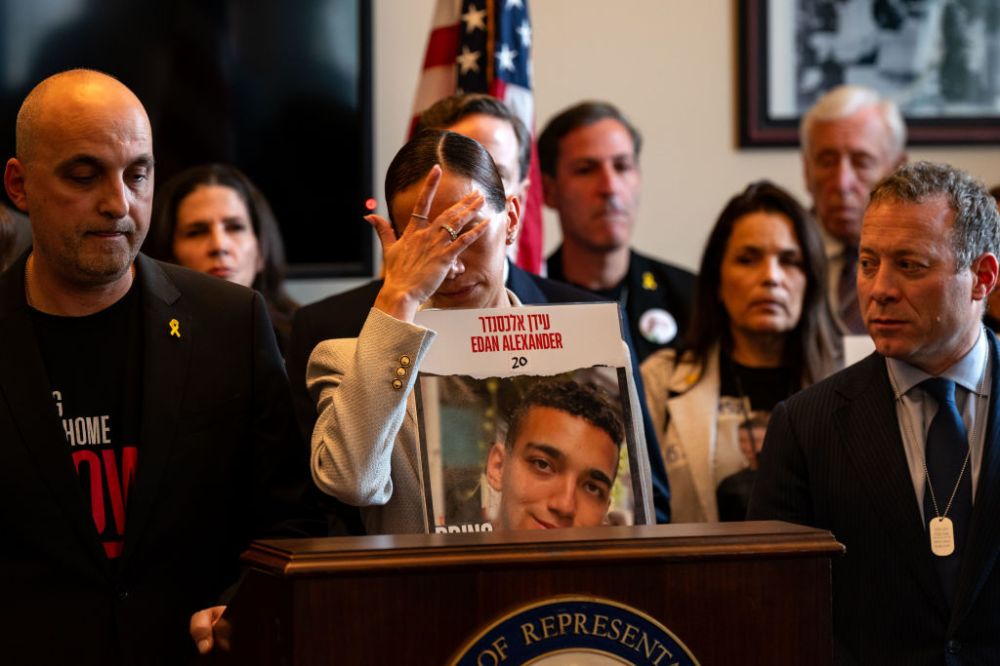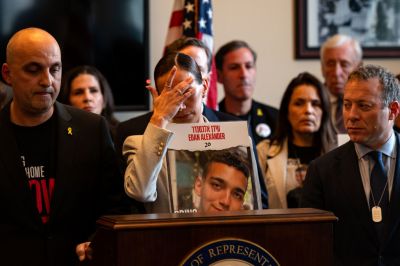Given all the important news this week about hush-money payoffs to porn stars and gluten-free options at pro-terrorist campouts, you’re forgiven if you missed some of the more marginal developments in world events.
Like jihadist maniacs forcing a U.S. citizen to beg for his freedom on camera with part of his arm conspicuously missing.
Hersh Goldberg-Polin is one of five Americans captured by Hamas during the October 7 pogrom who are still being held in Gaza—or so one hopes, as there’s no telling how many are alive. Itay Chen had long been listed as a sixth captive but it was discovered just last month that he was murdered during the initial attack last year.
Weirdly, we don’t hear much about them.
We do hear a little. As my colleague Alex Demas explained earlier this month, it’s not true that Joe Biden has wholly ignored the subject. The president met with the hostages’ families in December and received warm praise from them afterward. He acknowledged them during his State of the Union address as well, pledging that “we will not rest until we bring every one of your loved ones home.” As this week marked the 200th day of the hostages’ captivity, the White House released a joint statement with the leaders of numerous other countries whose citizens are being held urging Hamas to release the hostages in exchange for a ceasefire.
By no means is the administration pretending that the captives don’t exist. They’re just … not eager to remind the public of the situation. Which is weird.
Even weirder is that Republicans don’t seem all that eager to remind the public either.
And so the hostages are missing literally and figuratively, locked away in a dungeon somewhere in Gaza and absent, by and large, from the public debate over America’s response to the conflict. A recent YouGov poll asked respondents whether they thought the White House is doing all it can to get the hostages released and found an unusually ambivalent result, with 48 percent of Democrats insisting that Biden could do more and 31 percent of Republicans believing that he’s doing all he can. Normally, I’d expect extreme partisan skews with a question like that; the fact that we’re not seeing it leads me to suspect that most Americans don’t have strong feelings on the topic because they simply haven’t heard much about it.
Why haven’t they?
The hostages were a hot topic on last week’s Dispatch Podcast, reducing Jonah Goldberg and Sarah Isgur to hair-tearing exasperation over the White House’s relative silence. That exasperation was partly moral, with Jonah encouraging the press to put Biden officials on the spot during interviews by daring them to name even one of the Americans being held captive. If Team Joe won’t willingly raise public awareness about the captives’ fate, he reasoned, maybe they can be shamed into doing so.
But the frustration was also strategic. For months, Sarah noted, Biden’s administration has been attacked from the left for the supposed immorality of backing Israel’s operation in Gaza. Those attacks have succeeded in persuading a majority of Americans to oppose Israel’s military action. So why isn’t the White House going on offense and trying to regain the moral high ground by aggressively championing the cause of the hostages?
The logic isn’t complicated. Hamas has victimized our own citizens; Israel is punishing them for it and, with any luck, will end up liberating the captive Americans. The rooting interests should be clear for the U.S. population, or at least a lot clearer than they currently are. The fact that the administration isn’t trying to convert the public’s natural sympathy for the hostages into stronger support for Biden’s policy is political malpractice, Sarah argued.
It’s a good point. But I’m not sure that raising awareness about the hostages is as clear-cut a winning strategy as she suggests.
Joe Biden’s core political problem is the perception of weakness. That perception originates with his physical and mental condition, of course, which is why stories like this are newsworthy. But it isn’t limited to his age. Biden is also dogged by the evergreen political stereotype that Democrats are more prone to being pushed around by foreign malefactors than Republicans are.
It’s a bad rap to some extent, especially in an era when the right has begun to outflank the left on isolationism. Biden spearheaded the arming of Ukraine, vowed to defend Taiwan from a Chinese invasion, and dropped a “flying Ginsu” on the leader of al-Qaeda. It was clear that he was no peacenik even before he defied his base by backing Israel in Gaza.
But he also presided over the withdrawal debacle in Afghanistan. He sought dialogue with the terror state of Iran. And his early solidarity with Israel’s operations against Hamas has lately given way to something squishier as American public opinion has begun to turn. Meanwhile, his opponent in November is a man who’s obsessed with “strength” and “toughness,” which implicitly nudges voters to consider the alleged weakness of his opponent by comparison.
When your core political problem is a perception of weakness, you might not want to remind everyone that you’ve been utterly powerless to free Americans from the clutches of terrorist barbarians. For months.
The last time a Democratic president saddled with high inflation and a major hostage crisis in the Middle East faced a Republican preaching toughness and strength, it didn’t go great for him. Go figure that Joe Biden might prefer to let voters forget that there’s a crisis happening in the first place.
Raising awareness about the captives in Gaza would present another problem for him, though. Inevitably it would invite people to ask: Well, what are you going to do about it?
In theory, the richest country in the world, with the most powerful military, should be able to figure out a way to liberate its citizens from an outfit whose air force consists of paragliders. Realistically, of course, it cannot: Even if the Pentagon knows where the hostages are being held in Gaza, good luck infiltrating Hamas’ tunnel system, taking the captors by complete surprise, and somehow preventing the hostages from being killed deliberately or in the crossfire as the operation plays out.
The rescue attempt would almost certainly fail—and when it did, Biden wouldn’t be praised for his “toughness” and “strength” in having dared to order it. He’d be pilloried as not just incompetent but reckless in having placed the lives of American soldiers at risk despite little chance of success and having made the U.S. a direct combatant in the hopeless, endless Israeli-Palestinian conflict. The words “Operation Eagle Claw” would be heard for the rest of the campaign.
That’s what’s waiting for him if he tries to mobilize the public around freeing the hostages. So, he simply isn’t.
There are other reasons to avoid, or at least downplay, the topic. For starters, doing so would make Biden’s increasing equivocation between the two sides of the war less coherent. If “remember the hostages!” is his new rallying cry, why has he taken to calling for an immediate, unilateral ceasefire by Israel lately? The threat of a continued Israeli offensive is the only thing that might convince Hamas to start making concessions, which would naturally begin with freeing its captives.
I think Biden is also deeply spooked by the degree to which progressives might be willing to punish him this fall if he doesn’t continue to trend toward greater sympathy for the Palestinian side. Look no further than his comments earlier this week when he was asked about antisemitic agitation on American campuses. I condemn the protests, he said—before quickly adding, “I also condemn those who don't understand what's going on with the Palestinians.” To many, that smelled of Donald Trump’s comments after the white nationalist march in Charlottesville in 2017 about there being “very fine people on both sides.”
“Remember the hostages!” would signal that Biden was once again chiefly concerned with Hamas’ victims, not Israel’s, which is emphatically not what the left wants to see. Perhaps that shouldn’t matter: With public opposition to Israel’s military operations sitting at 55 percent, Biden should probably worry more about having lost the center than having lost the left. Championing the hostages could get the center back on his side, as Sarah imagined.
But I suspect the White House thinks the center will take care of itself. Once the conflict ends and swing voters are getting a snootful of candidate Trump every day on the trail, they’ll move toward Biden organically. It’s the left to which amends need to be made—a lot of amends, judging by the degree of insanity to which the most fervent Palestinian apologists have sunk:
So that’s what Biden is doing by biting his tongue about the hostages. Going easy on Hamas by declining to remind the American people that some of their countrymen remain prisoners in Gaza is the least the president can do for the cause of “progress.” Ditto for the leaders of his party in Congress, where Sen. John Fetterman has largely become a caucus of one among Democrats in remembering the hostages.
In theory, all of these careful political calculations have left Biden exposed politically. At any moment, Donald Trump could attack him for having failed miserably to secure the captives’ return or to have spoken up loudly on their behalf. And yet … he hasn’t. Not consistently, anyway.
Precisely because the hostage crisis risks making Biden look weak, you would think it’d be catnip for a strutting alpha male like his opponent. After all, the appeal of a strongman lies in his alleged ability to protect his people from harm. “Strength,” “toughness,” “law and order”: An authoritarian would never look the other way if a gang of jihadist miscreants took his citizens hostage. He’d smash them to bits—or, better yet, frighten them so terribly that they’d hand their prisoners over meekly without a fight.
In other words, this episode is right in Trump’s wheelhouse, particularly given how Republicans used the Iran hostage crisis of 1980 to great effect against Jimmy Carter. And he has mentioned the Gaza captives from time to time. But it’s not a recurring line of attack for him on the stump the way “witch hunt,” “rigged election,” or inflation and the border crisis are.
Which seems strange. But it isn’t, really.
I think this is another example of Trump chasing public opinion in hopes of expanding his appeal to swing voters. With only a few exceptions, like immigration, he’s shown in the last few months that he’s willing to pivot away from his base on practically any hot-button issue and toward a position that he has reason to believe might net him more votes across the electorate.
Abortion? He’s against a federal ban, never mind what pro-lifers want. Ukraine? He believes it’s an “important” U.S. interest, never mind what isolationists want. TikTok? He opposes a ban, never mind what China hawks want.
There’s electoral logic to each of those positions. Voters overwhelmingly oppose strict abortion bans and narrowly support maintaining aid to Ukraine. And while the polling on TikTok is mixed, opposition to the ban skews toward the platform’s young user base. Guess which age demographic has shown surprising openness lately to supporting Donald Trump this fall?
Trump’s reticence about the American prisoners held by Hamas is part of the same calculus, I think. He could bash Biden for weakness in failing to bring them home, and will occasionally, no doubt. But he surely knows what the polling on Israel’s counteroffensive looks like, just like he knows that those young voters whom he’s keen to attract sympathize with the Palestinian cause much more than their elders do.
So he’s begun to triangulate on the conflict, which requires treading lightly on the subject of the hostages. Like Biden, he’s trying to avoid alienating Palestinian supporters—possibly because he thinks he can make inroads with young adults, possibly because he's trying not to give potential Jill Stein supporters a reason to grudgingly support Biden out of antipathy to him. Shifting attention away from what Israel is doing to Gaza by focusing on what Hamas is doing to its American captives would risk antagonizing them.
Trump might also be wary of taking too firm a position on the subject at a moment when right-wing opinion on Israel is more complicated than it traditionally has been.
It’s not as complicated as it is on the left, Lord knows. A solid majority of Republicans continue to support Israel. Still, and quite inevitably, some of the more influential lights of post-liberal populism have lately begun to make their misgivings about the Jewish state known. Every demagogic political movement eventually works its way toward the same enemy; this one is no different. And Trump doesn’t like to disappoint his most ardent fans, especially ones with large megaphones who might plausibly convince members of the New Right that he’s “sold out” if he disappoints them.
The hostage question leaves him caught between the majority of his party and its least savory elements. Demanding their immediate return would gratify Reaganite hawks and traditional nationalists, whose pride is wounded by the thought of Hamas tormenting Americans with impunity. But it would also risk irritating the America First-ers and post-liberal nationalists who make up the ideological vanguard of Trumpism and who resent U.S. intervention abroad—perhaps especially when Israel benefits.
You know what they’ll say. “Sure, the hostages have American citizenship. But in some cases, like Hersh Goldberg-Polin’s, it’s dual citizenship. Are dual citizens truly loyal to America first? (Especially those people.) What were they doing in Israel in the first place? Why do we have a duty to rescue people foolish enough to visit a country where terrorist attacks are commonplace? If you hang out in a bad neighborhood, you shouldn’t be surprised if you end up the victim of a crime.”
That’s a minority attitude within the Republican Party, I’m sure. But it may be more popular than we think, such that Trump wouldn’t be crazy to worry that he’ll alienate an element of his base by championing the hostages too aggressively. Which could be costly in a year where there’s a third-party alternative on the ballot who appeals to the right’s fringier elements.
The hard truth is that the public’s enthusiasm for bringing home hostages always depends in part on who the hostage is, who’s taken them, and/or what the circumstances of their abduction were. We can and should aspire to an ideal in which the mere fact of their citizenship is enough to galvanize bipartisan support for their urgent return, but it rarely is. Witness Bowe Bergdahl, whom the Obama administration triumphantly freed from Taliban captivity in a prisoner exchange only to see him accused of having willfully deserted his military post. The backlash that followed was ferocious.
Or consider WNBA star Brittney Griner. She was detained by Russia for the better part of a year in 2022 before being exchanged for imprisoned arms dealer Viktor Bout. Republicans from Donald Trump on down condemned that trade, demanding to know why another prisoner of Moscow, former Marine Paul Whelan, wasn’t part of it. The implication was that Democrats valued Griner’s life more highly than Whelan’s because she’s black, gay, female, and a celebrity, all elements associated with liberal politics. The fact that Russia has been a recurring foil for the American left over the last 10 years and much less of one for the American right probably also influenced why the two sides diverged on her release so sharply.
The problem for the Gaza hostages may be that neither side really wants to “claim” them as their own. Hamas is not a convenient foil for Democrats right now, when most of the left’s political energy on the war is being driven by Palestinian sympathizers. But dual Israeli-American citizens are an awkward match for the right at a moment when blood-and-soil nationalism has gained traction within the GOP. The forces of illiberalism are on the march within both parties. Who gains, then, from caring about an American Jew with half an arm?







Please note that we at The Dispatch hold ourselves, our work, and our commenters to a higher standard than other places on the internet. We welcome comments that foster genuine debate or discussion—including comments critical of us or our work—but responses that include ad hominem attacks on fellow Dispatch members or are intended to stoke fear and anger may be moderated.
With your membership, you only have the ability to comment on The Morning Dispatch articles. Consider upgrading to join the conversation everywhere.